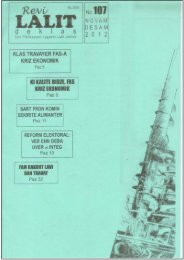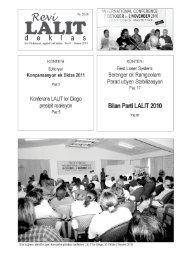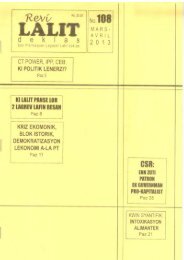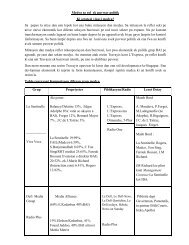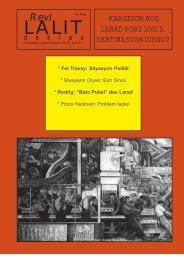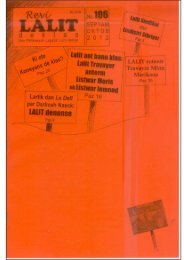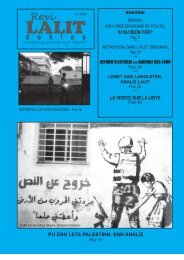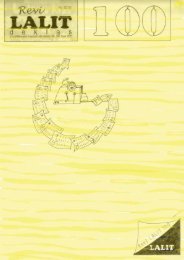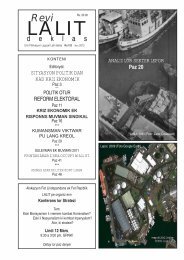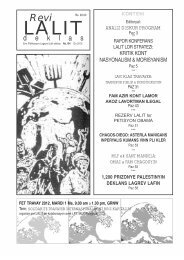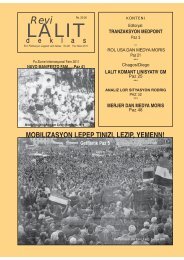Against communalism of the best-loser system - Lalit Mauritius
Against communalism of the best-loser system - Lalit Mauritius
Against communalism of the best-loser system - Lalit Mauritius
You also want an ePaper? Increase the reach of your titles
YUMPU automatically turns print PDFs into web optimized ePapers that Google loves.
Philip Baker in his book KREOL (A Description <strong>of</strong> Mauritian Creole) published by C. Hurst (London) in<br />
1972 writes at page 12 -<br />
“it is this writer's experience that many Indo-Mauritians understand “mo<strong>the</strong>r tongue” to<br />
mean “language spoken by one's ancestors at <strong>the</strong> time <strong>of</strong> <strong>the</strong>ir arrival in <strong>Mauritius</strong>”.<br />
Whatever may have been <strong>the</strong> mo<strong>the</strong>r tongue <strong>of</strong> <strong>the</strong> parents, again this cannot determine Respondents way<br />
<strong>of</strong> life.<br />
I have <strong>the</strong>refore been unable to determine whe<strong>the</strong>r, from <strong>the</strong>ir way <strong>of</strong> life, Respondents belong to <strong>the</strong><br />
Hindu, Muslim or Sino-Mauritian communities.<br />
Before I make any determination as to Respondents' community some remarks are called for as to <strong>the</strong><br />
composition <strong>of</strong> <strong>the</strong> Mauritian Population. According to <strong>the</strong> Census Report <strong>of</strong> 1881 <strong>the</strong> population was<br />
divided into 2 classes as was done in 1861 and 1871-<br />
1. The Indian Population<br />
2. The General Population<br />
“The former comprising not only Indians born in India, but all persons <strong>of</strong> unmixed Indian<br />
origin, whatever <strong>the</strong>ir birth place or nationality, and <strong>the</strong> latter all <strong>the</strong> o<strong>the</strong>r inhabitants <strong>of</strong> <strong>the</strong><br />
island irrespective <strong>of</strong> descent, birth-place or nationality”.<br />
By 1911 <strong>the</strong> population was divided into an Indian Population, a General Population and <strong>the</strong> Chinese. See<br />
<strong>the</strong> Chapter on People and Politics by Henri Leclézio in Allister Macmillan's MAURITIUS<br />
ILLUSTRATED (Collingridge 1914). According to Leclézio at pages 139 to 141, <strong>the</strong> general population<br />
was composed <strong>of</strong> <strong>the</strong> white population, <strong>the</strong> gentry <strong>of</strong> colour, <strong>the</strong> coloured middle class, <strong>the</strong> working<br />
classes and <strong>the</strong> inferior classes. The Indian population consisted <strong>of</strong> Christians, Hindoos, Mohammeddans<br />
and o<strong>the</strong>rs. (Census <strong>of</strong> 1911). With <strong>the</strong> assistance <strong>of</strong> <strong>the</strong> Statistical Bureau <strong>of</strong> <strong>the</strong> Chamber <strong>of</strong> Agriculture,<br />
Leclézio was able to subdivide <strong>the</strong> number <strong>of</strong> Hindoos as Calcutta, Madrasses, Coringhees, Bombay,<br />
Mohammeddans and o<strong>the</strong>rs. For <strong>the</strong> 1962 census <strong>the</strong> Indo-Mauritian population was subdivided into<br />
Hindus and Muslims. It is this subdivision which may lead some people to believe that community is<br />
based on religion. For <strong>the</strong> census carried out in 1962 and 1972, <strong>the</strong> people <strong>of</strong> <strong>Mauritius</strong> had to declare<br />
which community <strong>the</strong>y belonged to. The information to be obtained in <strong>the</strong> census was specified in <strong>the</strong><br />
Order made by <strong>the</strong> Governor-General, subject to <strong>the</strong> approval by resolution <strong>of</strong> <strong>the</strong> Assembly under<br />
Section 5 <strong>of</strong> <strong>the</strong> Statistics Act. Following <strong>the</strong> amendment to <strong>the</strong> First Schedule to <strong>the</strong> Constitution no data<br />
on community was collected in 1983 and <strong>the</strong>reafter.<br />
Although some may hold <strong>the</strong> view that <strong>the</strong> members <strong>of</strong> <strong>the</strong> General Population are Christians nowhere is<br />
this mentioned. Thus <strong>the</strong> General Population means all <strong>the</strong> inhabitants <strong>of</strong> <strong>Mauritius</strong> who are not Hindus,<br />
Muslims or Sino-Mauritians. Paragraph 3(4) <strong>of</strong> <strong>the</strong> First Schedule is very clear in this respect. The<br />
General Population is what some may call a residual group which is considered to be a community for <strong>the</strong><br />
allocation <strong>of</strong> <strong>the</strong> <strong>best</strong> <strong>loser</strong> seats.<br />
In his book “Us and Them in Modern Societies - Ethnicity and Nationalism in <strong>Mauritius</strong>, Trinidad and<br />
Beyond”, (Scandinavian University Press -1992), Thomas Hylland Eriksen considered that <strong>the</strong> General<br />
Population consists <strong>of</strong> 3 very distinctive ethnic categories (l) <strong>the</strong> Franco-Mauritians (whites), (2) <strong>the</strong> gens<br />
de couleur (coloured) and (3) <strong>the</strong> creole (blacks). But if we go according to <strong>the</strong> First Schedule, it is not as<br />
simple as that because <strong>the</strong> General Population is a residual community where everybody who does not<br />
think <strong>of</strong> himself as Hindu, Muslim or Sino-Mauritian or does not live <strong>the</strong> way <strong>of</strong> life <strong>of</strong> <strong>the</strong>se 3<br />
communities may find himself.<br />
Eriksen concedes at page 169 <strong>of</strong> his book -<br />
“Even if ethnicity is acknowledged as important, <strong>the</strong>re may be pr<strong>of</strong>ound disagreement over<br />
<strong>the</strong> classification <strong>of</strong> ethnic categories -ethnic classification in <strong>Mauritius</strong> is highly<br />
ambiguous and context-dependent”.<br />
The ideal situation would be for all Mauritians to feel that <strong>the</strong>y belong to <strong>the</strong> General Population <strong>of</strong><br />
<strong>Mauritius</strong> if <strong>the</strong>y do not wish to be categorised into communities. At page 76 <strong>of</strong> his book Eriksen says<br />
that <strong>the</strong> General Population cannot meaningfully be said to constitute a socio-cultural identity but in my<br />
view it could eventually constitute a united Mauritian community.<br />
In <strong>the</strong> light <strong>of</strong> those remarks I shall now examine how to resolve <strong>the</strong> correctness <strong>of</strong> <strong>the</strong> declaration as to<br />
community made by <strong>the</strong> Respondents.<br />
I shall restrict myself to what <strong>the</strong> Respondents have <strong>the</strong>mselves stated from a subjective angle. Since <strong>the</strong>y<br />
do not believe in making a faithful declaration as to <strong>the</strong>ir community, <strong>the</strong>y have proceeded by way <strong>of</strong><br />
drawing <strong>of</strong> lots. This is not in order. At <strong>the</strong> same time <strong>the</strong>y do not subjectively feel that <strong>the</strong>y belong to <strong>the</strong><br />
first 3 communities Hindu, Muslim, Sino-Mauritian. One Respondent said that he did not know what is a<br />
Hindu and <strong>the</strong>refore could not say that he belongs to that community. I shall <strong>the</strong>refore apply <strong>the</strong><br />
provisions <strong>of</strong> paragraph 3(4) <strong>of</strong> <strong>the</strong> First Schedule <strong>of</strong> <strong>the</strong> Constitution strictly.<br />
Those Respondents who were called on personal answers, since <strong>the</strong>y do not appear from <strong>the</strong>ir own<br />
evidence to belong to <strong>the</strong> first 3 communities and have admitted having made <strong>the</strong>ir declaration by<br />
drawing <strong>of</strong> lots, <strong>the</strong>refore belong to <strong>the</strong> General Population. This would apply also to those Respondents<br />
who were absent from <strong>the</strong> proceedings as <strong>the</strong> drawing <strong>of</strong> lots applied to all <strong>the</strong> Respondents as members<br />
<strong>of</strong> <strong>Lalit</strong> and Nouvo Lizour. I also find that <strong>the</strong> undertaking that <strong>the</strong>y have given not to participate in <strong>the</strong><br />
allocation <strong>of</strong> <strong>best</strong> <strong>loser</strong> seats, should <strong>the</strong>y be entitled to do so, is binding upon <strong>the</strong>m and I recommend that



